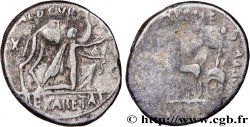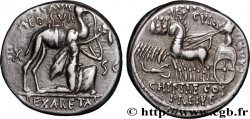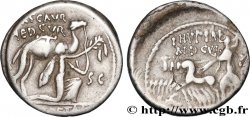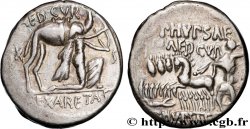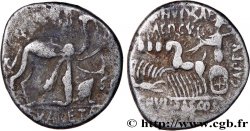正面
正面的文字 M. SCAVR// AED CVR// EX - SC// REX ARETAS À L'EXERGUE.
正面的说明书 Le Roi Aretas agenouillé à droite, tenant de la main droite une palme et de la gauche, la bride de son chameauEAUCTION.
正面的翻译 “Marcus Scaurus Ædilis Curulis ex Senato Consulto Rex Aretas”, (Marcus Scaurus édile curule avec l’accord du Sénat, roi Arétas).
背面
背面的文字 P. HVPSAE// AED CVR// C HVPSAE COS PREIVE// CAPTV.
背面的说明书 Jupiter dans un quadrige galopant à gauche, brandissant un foudre de la main droite et tenant les rênes de la gauche ; sous les chevaux, un scorpion.
背面的翻译 “Publius Hypsæus Ædilis Curulis Caius Ypsæus Consul Preivernum Captum”, (Publius Hypsæus édile curule, Caius Ypsæus a capturé Privernum).
历史细节
AEMILIA
(58 BC)
Marcus Æmilius Scaurus is the son of Marcus Æmilius Scaurus, consul in 115 BC. -VS. , and Sulla's son-in-law. He was Pompey's quaestor during the Third Mithridatic War (74-63 BC).. -VS. ) and was appointed governor of Syria by Pompey in 64 BC. -VS. He invaded Judea. Publius Plautius was curule aedile in 58 BC. -VS. with Marcus Aemilius Scaurus. They receive from the senate the authorization to register their names on their common coinage. Plautius has belonged to a senatorial family since Marcus Plautius Hypsaeus was consul in 125 BC. -VS. They give great games. Upon leaving office, Plautius obtains the praetorship in 55 and 54 BC. -VS. He must take the consulate in 52 BC. -VS. , for which he is one of Pompey's candidates. Publius Clodius was assassinated by Milo, an enemy of Plautius on January 18, 52 BC.. -VS. Pompey is appointed sole consul to restore order and security in Rome, where rival gangs clash. It is Metellus Scipio, son-in-law of Pompey, who shares the consulship. Publius Plautius Hypsaeus is discarded and rejected by Pompey, his former ally, before being condemned and exiled. He then disappears from history.. After the charge of curule aedile, Marcus Æmilius Scaurus is praetor in 56 BC. -VS. and must run for the consulship in 54 BC. -VS. , but he is accused of ambition ("ambitius"). Then again in 52, and like Plautius, he was condemned and exiled.









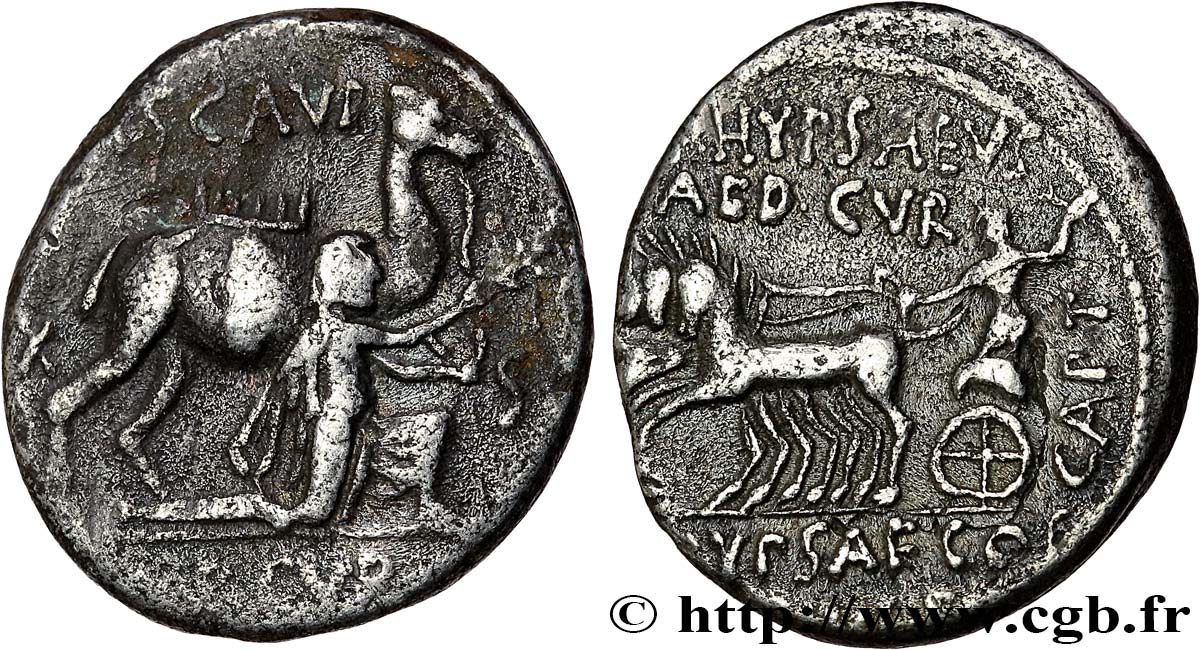
 对产品描述纠错
对产品描述纠错 打印
打印 分享我的选择
分享我的选择 提问
提问 Consign / sell
Consign / sell
 产品介绍
产品介绍